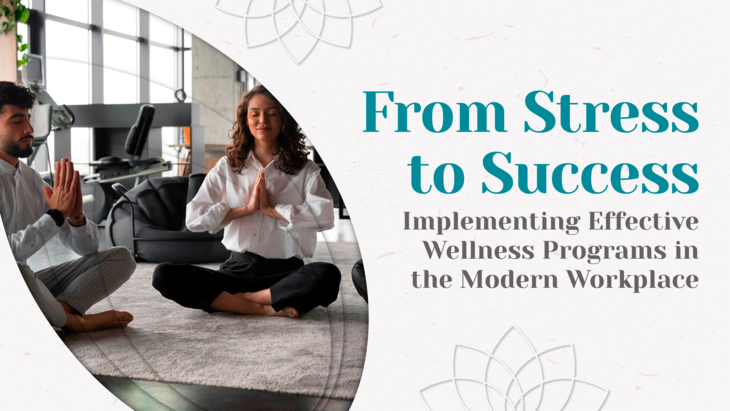In today's fast-paced world, stress has become an inevitable part of our lives. Whether it's due to work pressures, personal challenges, or societal expectations, stress can take a toll on our physical and mental well-being. However, by implementing effective stress management techniques, we can mitigate its adverse effects and lead a more balanced life.
We Have Listed Out The 6 Stress Management Techniques
- Introduction To Overview of Stress Management
- Identifying Stress | Recognizing Stress Triggers
- Lifestyle Adjustments | Healthy Habits for Stress Reduction
- Time Management | Efficiently Utilizing Time for Stress Reduction
- Relaxation Techniques Incorporating Relaxation Practices into Daily Routine
- Social Support | Importance of a Supportive Social Network
- Mindfulness and Meditation | Practices for Mindful Living
- Physical Activity | Exercise as a Stress Reliever
- Dietary Considerations | Nutrition's Role in Stress Management
- Sleep Hygiene | Quality Sleep for Stress Reduction
- Professional Help | Seeking Assistance When Needed
- Workplace Stress Management | Coping Strategies for Work-Related Stress
- Conclusion | Recap of Key Stress Management Techniques
Identifying Stress
Understanding what triggers stress is the first step towards managing it effectively. Stressors can vary from person to person and may include work deadlines, financial worries, relationship issues, or health concerns. By identifying these triggers, individuals can develop coping mechanisms tailored to their specific needs.
Lifestyle Adjustments
Making lifestyle adjustments is crucial for reducing stress levels. This includes adopting healthy habits such as regular exercise, balanced nutrition, adequate sleep, and relaxation techniques. By prioritizing self-care, individuals can build resilience against stress and enhance their overall well-being.
Time Management
Effective time management is essential for reducing stress and increasing productivity. By prioritizing tasks, setting realistic goals, and avoiding procrastination, individuals can better manage their workload and minimize feelings of overwhelm.
Relaxation Techniques
Incorporating relaxation techniques into daily life can help alleviate stress and promote relaxation. Practices such as deep breathing exercises, progressive muscle relaxation, and mindfulness meditation can calm the mind and body, leading to a greater sense of peace and tranquility.
Social Support
Maintaining strong social connections is vital for managing stress. Having a supportive network of friends, family, or colleagues can provide emotional validation, practical assistance, and a sense of belonging, buffering against the negative effects of stress.
Mindfulness And Meditation
Practicing mindfulness and meditation can cultivate awareness and presence, allowing individuals to respond to stressors more effectively. By staying grounded in the present moment and observing thoughts and emotions without judgment, individuals can reduce anxiety and enhance resilience.
Physical Activity
Regular physical activity is not only beneficial for physical health but also plays a significant role in stress management. Exercise releases endorphins, neurotransmitters that act as natural mood lifters, promoting feelings of well-being and relaxation.
Dietary Considerations
Nutrition plays a crucial role in stress management, as certain foods can either exacerbate or alleviate stress. Consuming a balanced diet rich in fruits, vegetables, whole grains, and lean proteins can support overall health and resilience to stress.
Sleep Hygiene
Quality sleep is essential for stress reduction and overall well-being. Poor sleep habits can exacerbate stress levels, while adequate restorative sleep can enhance mood, cognitive function, and emotional resilience.
Professional Help
Seeking professional assistance is sometimes necessary for managing chronic or overwhelming stress. Therapists, counselors, or mental health professionals can provide valuable support, guidance, and therapeutic interventions tailored to individual needs.
Workplace Stress Management
Implementing effective coping strategies in the workplace is essential for maintaining employee well-being and productivity. This may include promoting work-life balance, fostering a supportive organizational culture, providing stress management resources, and offering employee assistance programs.
Conclusion
In conclusion, stress management is a multifaceted process that requires a holistic approach addressing various aspects of life. By incorporating the six stress management techniques outlined above—identifying stress, making lifestyle adjustments, practicing time management, implementing relaxation techniques, seeking social support, and prioritizing self-care individuals can cultivate resilience, enhance well-being, and lead a more balanced and fulfilling life.
FAQs [FREQUENTLY ASKED QUESTIONS]
How can I quickly relieve stress during a busy day?
Engage in deep breathing exercises, take short breaks to stretch or walk, and practice mindfulness for a few minutes to center yourself and alleviate stress.
Is it normal to feel stressed at work?
Yes, feeling stressed at work is common, but it's essential to address it through effective stress management techniques to prevent it from negatively impacting your well-being and productivity.
Can dietary changes help reduce stress?
Yes, consuming a balanced diet rich in nutrients can support overall health and resilience to stress. Avoiding excessive caffeine, sugar, and processed foods can also help regulate mood and energy levels.
How can I improve my sleep quality?
Establish a regular sleep schedule, create a relaxing bedtime routine, limit screen time before bed, and create a comfortable sleep environment to promote better sleep quality.
What role does exercise play in stress management?
Regular physical activity releases endorphins, natural mood lifters, and reduces levels of stress hormones in the body, promoting relaxation and overall well-being.
When should I seek professional help for stress management?
If you're experiencing chronic or overwhelming stress that significantly impacts your daily functioning and quality of life, consider seeking support from a therapist, counselor, or mental health professional.






Leave a reply